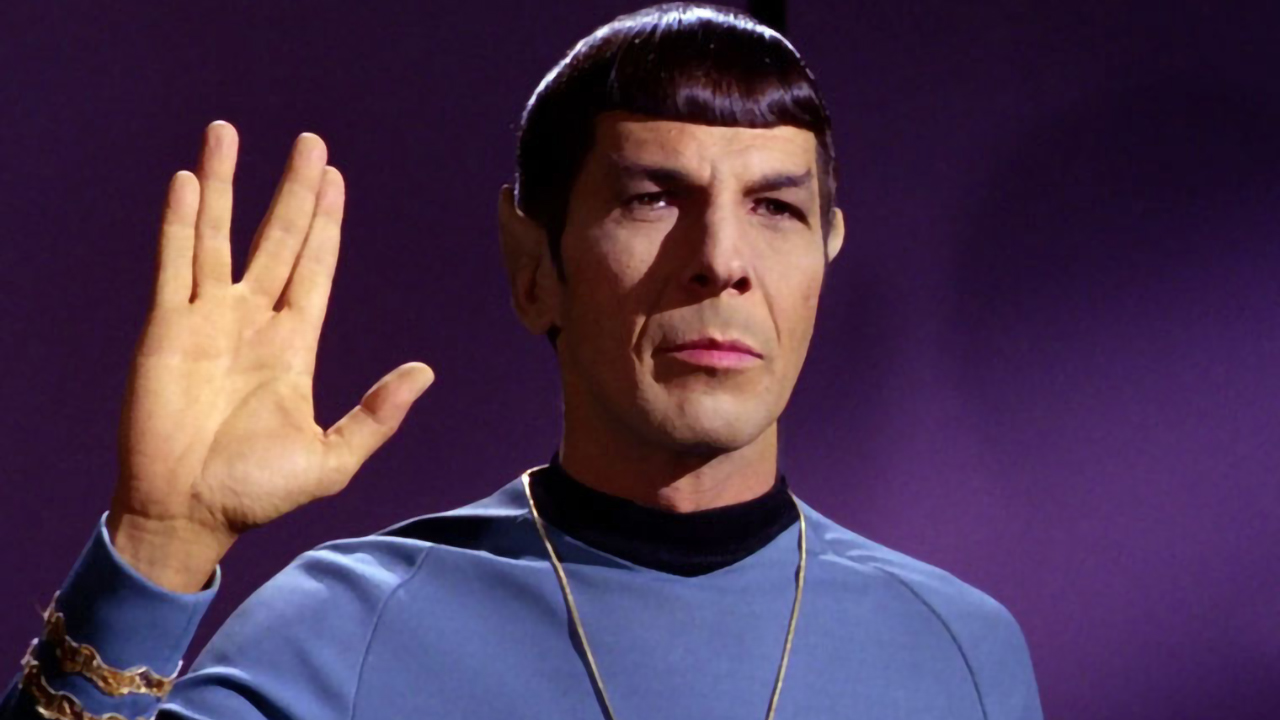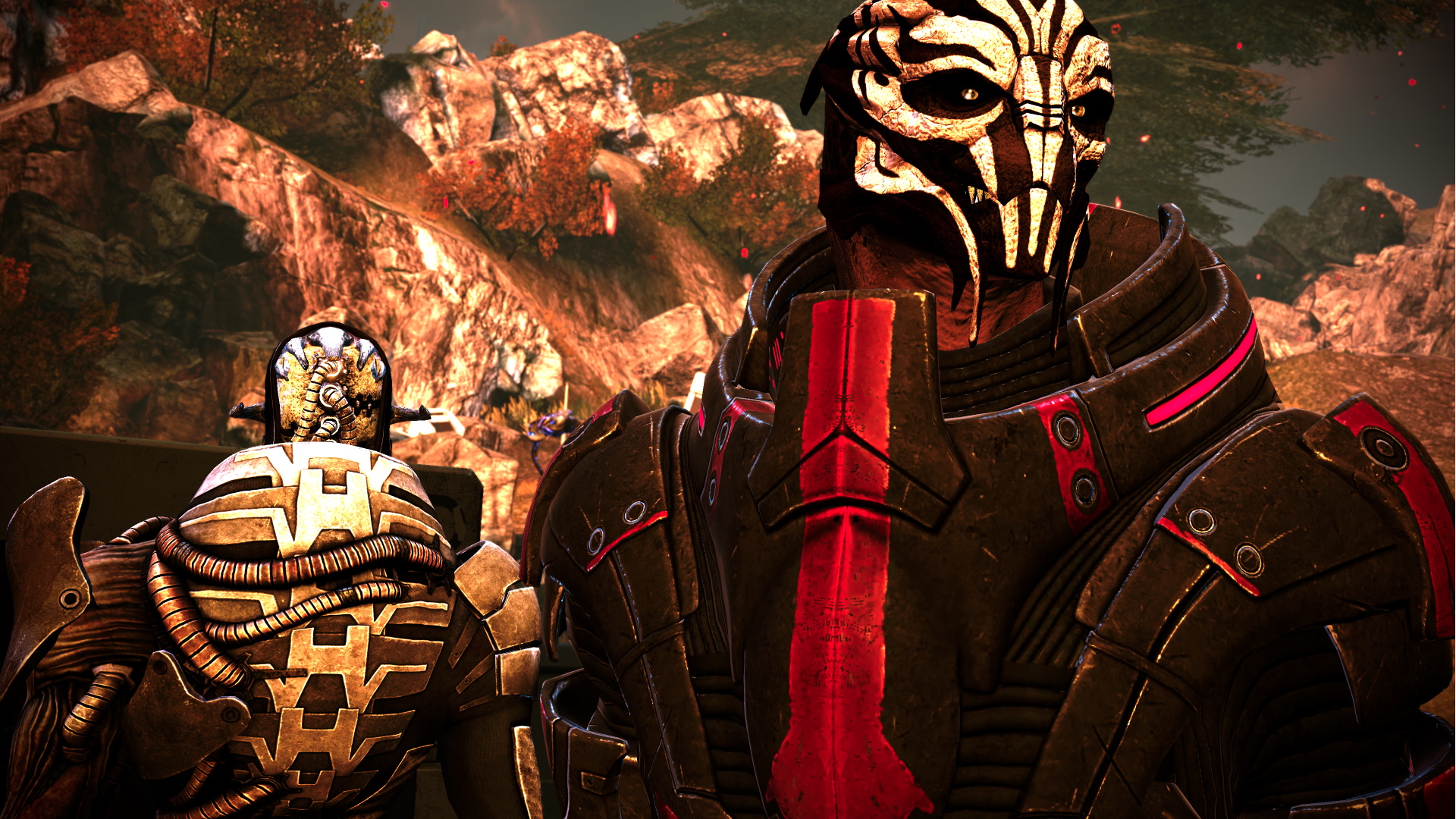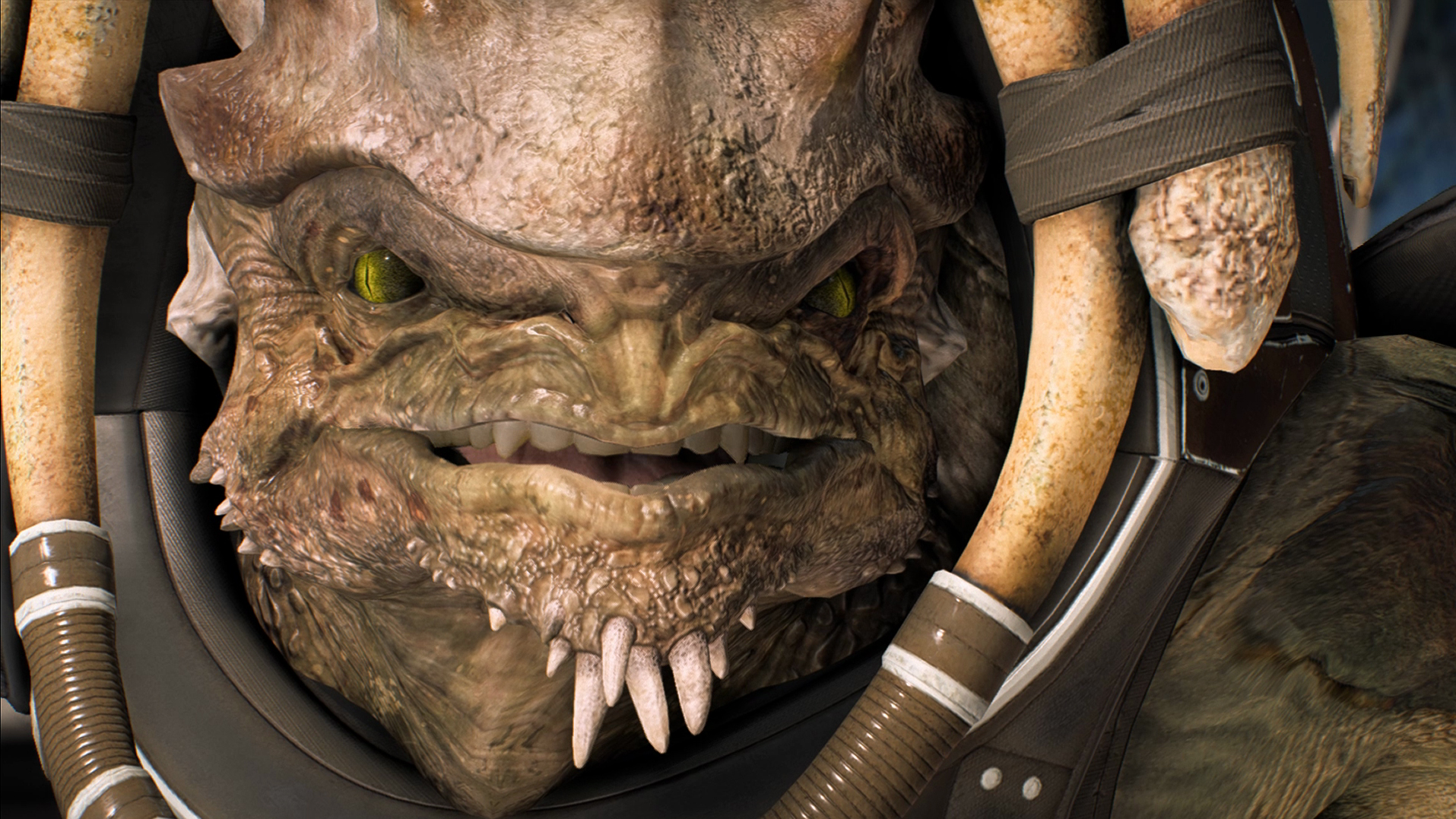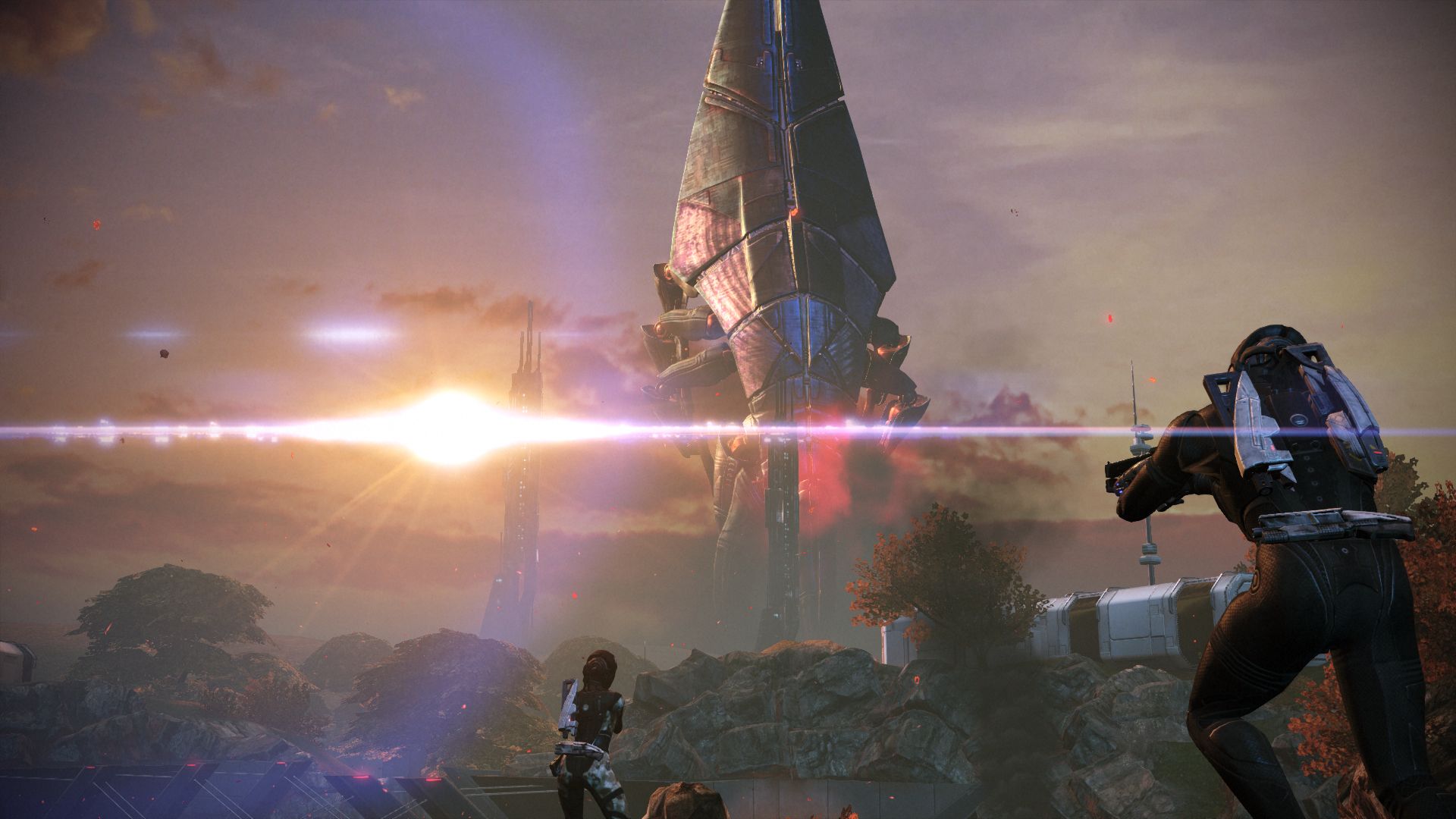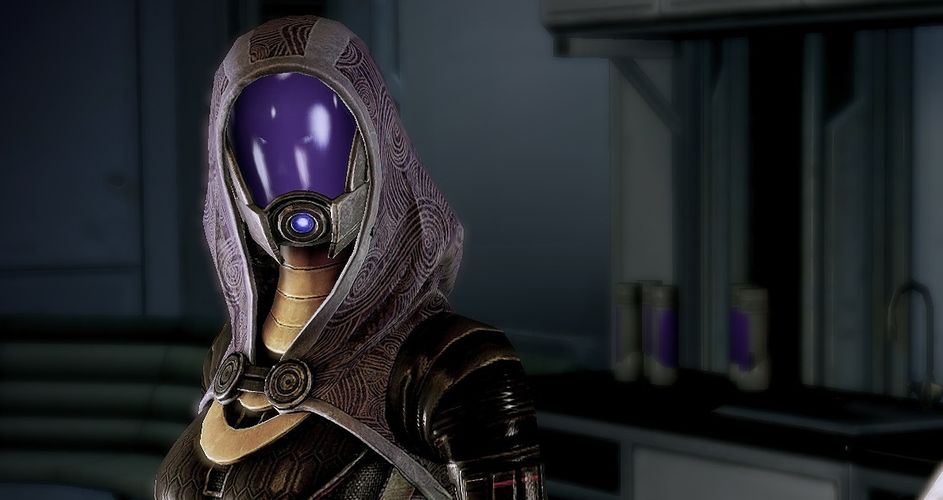After talking to a scientist, Mass Effect's aliens are more believable than I ever expected
We talk to the SETI Institute's senior astronomer about possible alien biology, technology, and culture to find out how Mass Effect's aliens stack up.
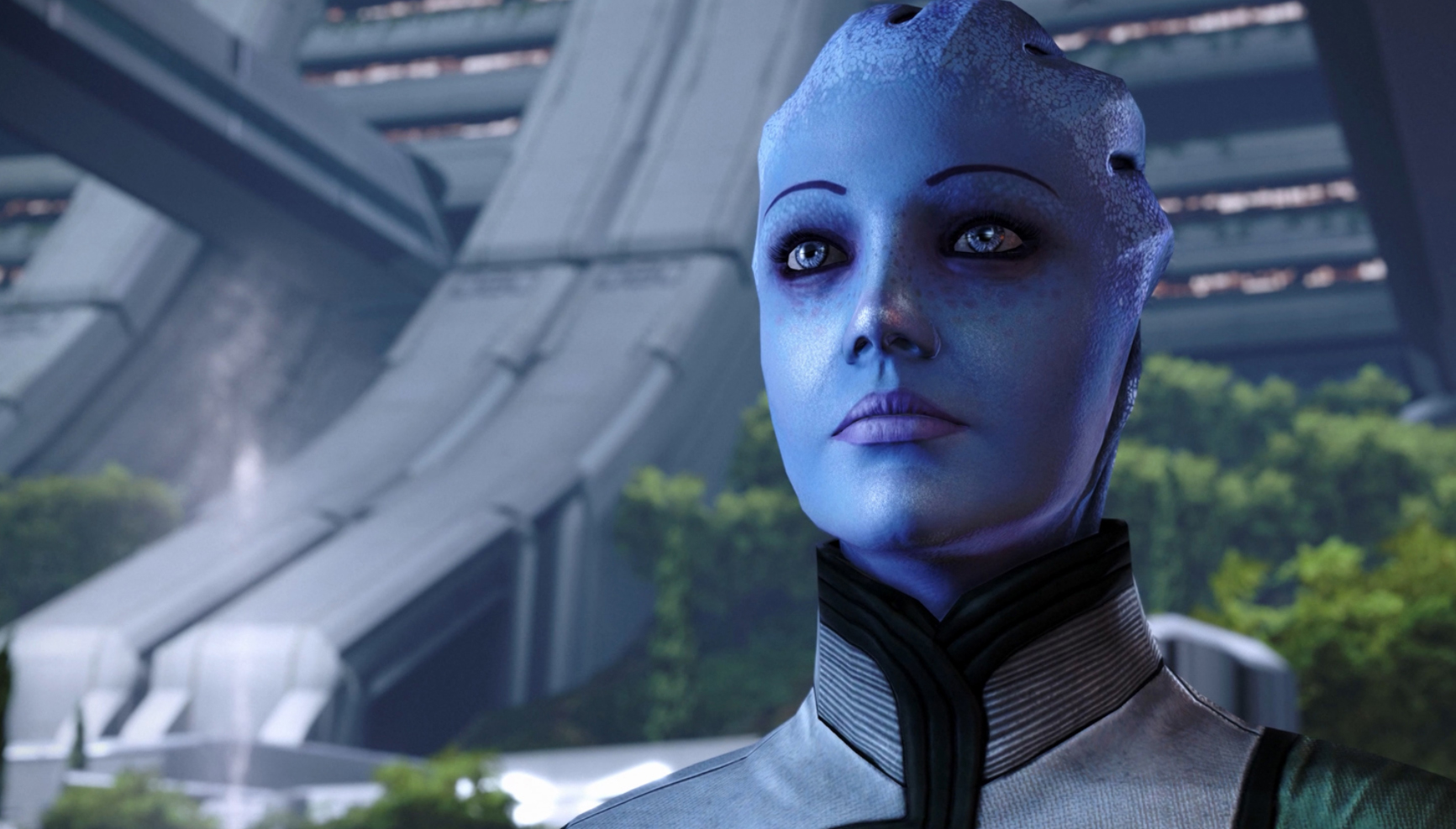
When it comes to aliens, Mass Effect leaves no options unexplored. You can fight alongside them, war with them, befriend them, joke with them, and, yes, even have sex with a few of them. It's a space opera where humanity is just one tiny fraction of a much bigger galactic community of intelligent species, ranging from the dour, bird-like Turians to the devout and very squishy Hanar.
You can't throw a stone in Mass Effect's version of our Milky Way galaxy without hitting a new alien species. But for astronomers like Seth Shostak, the search for aliens isn't quite so easy. "You do what Jodie Foster did in the movie Contact," Shostak tells me over the phone. "You use big antennas, you point them at nearby star systems that might have a planet with some aliens on it, and you try and eavesdrop on any signals they may be broadcasting."

SETI stands for the "search for extraterrestrial intelligence" and is a collective term to describe our research into the statistical likelihood that we're not alone in the universe. The SETI Institute is just one of many different initiatives, founded in 1984 as a non-profit organization largely funded by private contributions.
With an estimated 400 billion planets in the Milky Way galaxy, however, the odds are stacked against us. "You don't know which direction to point the antenna, you don't know where on the radio dial the signal might come in, and—most people don't know this—you point in that direction and you might be listening to millions of frequencies at a time, but they all get about three minutes of listening pleasure. You have to hope that the signals you are looking for are persistent enough that they arrive at your antenna at the exact right time you're looking, and the universe has been around for 13.5 billion years, so the chances aren't great."
It's ridiculous to assume that Mass Effect's depictions of aliens could be at all accurate, but I wanted to ask Shostak about them anyway and explore the common mistakes that science fiction makes in depicting alien life.
With a doctorate in astronomy from the California Institute of Technology, Shostak has spent most of his career writing about space and conducting radio astronomy research. He works as a senior astronomer at the SETI Institute, spearheading different research initiatives like using radio and optical telescopes to search for signs of possible life in our galaxy. He's one of the few people on the planet who can call themselves an alien hunter without raising some eyebrows.
Along with around a hundred other scientists, Shostak works tirelessly to scan the stars for anything that might indicate we're not alone. He's at the forefront of an entirely hypothetical branch of science: the study of extraterrestrial life. While no one truly knows what intelligent life might be, Shostak at least has some science to back up his hypotheses.
Heads up: This story has big spoilers for the entire Mass Effect series.
Keep up to date with the most important stories and the best deals, as picked by the PC Gamer team.
Sci-fi aliens look like us because it's convenient
In Mass Effect's lore, humanity discovers ancient alien technology orbiting Pluto that can transport ships to the far reaches of the galaxy. This discovery sparks a gold age of human expansion starting in the year 2150, but also leads to a pivotal discovery. Humans are surrounded by a vast community of intelligent species that didn't know we existed.
At the center of that community is an enormous space station called The Citadel where dozens of species co-exist together harmoniously. Walking through The Citadel is like taking a stroll through Heathrow Airport, except the travellers you pass are human-sized jellyfish, rotund little moles, creepy insectoids, and gorilla-like lizards. It makes for some great sci-fi, but unsurprisingly, Shostak says that it's unlikely humanity will ever rub elbows with aliens at some great cosmic bloc party. There's just way too many problems to overcome.
Most of Mass Effect's races are bipedal creatures with two legs, two arms, mouths, ears, and—judging by the series' romance scenes—butts. It's part of a long tradition in sci-fi that exists because of the practical challenges in telling a story about creatures that could be beyond our comprehension. "If the portrayed aliens were to look like my bicycle in my garage, you couldn't relate to it and you wouldn't know what it was," Shostak says. "But if it's just a guy with no hair and just a little shorter in stature at least you could relate to him. You can really have an alien that looks like anything, but then you need a backstory that tells the audience that this is an alien. So [making them humanoid] is a shortcut. We have this unconscious idea of what aliens are like and you don't have to explain it if you go with the iconic alien."
Shostak says this is because our understanding of life is entirely based on our knowledge of Earth—of which all its life shares common ancestors through evolution. But because we're simply a product of our environment, we can't know how evolution might shape a creature living on a different planet.
That can be taken in some pretty wild directions. In the 1957 sci-fi novel by famous English astronomer Fred Hoyle, The Black Cloud, a giant super-intelligent cloud arrives in our solar system and inadvertently causes dramatic climate change by blocking out the sun. Verner Vinge's A Fire Upon the Deep imagines a race of canine aliens called Tines where each person is actually a group-mind consisting of half a dozen individual dogs that communicate to one another using fleshy organs that emit soundwaves. It's weird.
While it's fun to imagine life taking the shape as something so mind-bending, Mass Effect actually makes some damn good assumptions about alien life—even if it's overly optimistic that all those species would get along so easily.
Alien biology
Are Mass Effect's aliens biologically accurate?
Mass Effect's core assumption is that aliens, like us, are products of evolution over millions and millions of years. That might not be true, but because we don't have any examples of a life that doesn't adhere to the laws of Darwinism, we don't know for sure.
Here's what Mass Effect gets right and wrong about its alien biology:
It's very likely aliens would have a similar form to us
Assuming we evolved in similar ecosystems, that is. This is based on the "convergent evolution" theory, the idea that organisms don't evolve randomly but develop similar features and characteristics despite not having a common ancestor with those same features. Essentially, evolution pushes us into optimal configurations, which explains why so many species on Earth independently evolved eyes.
We could share plenty of other features with aliens, too. "First off, we have this bipedalism, this upright stance," Shostak says. "That has survival value if you're playing around in savannahs for a couple hundred thousand years because you can see over the grass. With two legs, you can see over the topography so you can spy something that wants to eat you or you want to eat."
Having two arms, though? That's just an accident
"There's a fish called a Tiktaalik that is the ancestor of us and all the four-appendaged beings on the Earth," Shostak explains. "And if you think about it, four is not the usual number [of appendages] on Earth. That number is six—because of all those insects. Six obviously works, and you could imagine that the aliens have two appendages for walking and then four for using tools or playing the piano, and that would make sense too. That we just have four limbs is just an accident."
According to Shostak, then, Mass Effect's aliens should probably have more variety in their configuration of limbs.
Mass Effect's aliens are mostly consistent with the laws of evolution
The Krogan are a perfect example. Born on an extremely hostile planet rife with terrifying predators and severe climates, the Krogan were the bottom of the food chain and spent most of their collective history as prey. Like a lot of reptiles, they evolved side-facing eyes as a defense mechanism so they could more easily spot incoming predators, and their hyperactive reproductive systems ensured the species could replenish in such a fatal ecosystem.
This kind of evolutionary logic is present in all of Mass Effect's primary alien species, which is a big reason why its depiction of a far-future universe is so believable. But just because we might look the same doesn't mean we'll ever understand one another.
Reproductive sex with aliens is definitely not on the table
"It's like contemplating having sex with the house flies that get in through the front door," Shostak says. "There's a biological incompatibility. It wouldn't work for all sorts of reasons. The idea that you'd have that sort of relationship with an alien, well, dream on. They're probably not going to have DNA to begin with, and the whole apparatus will be different, and beyond that maybe they haven't showered in a week—who knows?"
Of course, that's viewing sex strictly as a means of reproduction. Mass Effect's sex scenes are an expression of two characters' emotional attachment to one another, which is a problem that can be solved with a little creativity.
Our biology would make colonizing alien worlds a logistical nightmare
You'd probably die.
Seth Shostak
"Your first thought is, oh, well there's oxygen in the air and there's plants around, I'll just make a living here," he explains. "But you can't forget about your gut bacteria, because those are going to be different in terms of their function in some other world and they're not DNA-based so they can't really help you. You'd probably die."
One of the shortcomings of evolution is that it is specific to one kind of ecosystem. And humans are still pretty young as a species. We've barely adapted to Earth's different climates, so hopping between several planets would probably kill us.
If people can't even eat food from different countries without suffering from diarrhea, how will our bodies handle eating entirely alien foods? It's not just food that needs consideration, either. Subtle variations in gravity, radiation, ozone composition, and bacteria would all present significant threats to our survival on other planets. In order to survive, colonies would likely need to constantly transport food and water from their homeworld or terraform part of the planet to be more comfortable. Mass Effect mostly waves these issues away with convenient technological advances, but at least it doesn't ignore them entirely like most sci-fi stories do. The Quarians, for example, are an alien race that almost never takes off their highly specialized enviro-suits because their immune systems are so frail. In reality, that kind of technology might be required by any species that travels the galaxy.
Alien communication
Mass Effect avoids real issues with communication
There are common-sense rules that are likely to be organizing principles in any society that protect the society as a whole.
Seth Shostak
Evolutionary biology is just one of the dozens of conundrums we face when thinking about aliens. Shostak's work at the SETI Institute is the epitome of taking things one step at a time. Once scientists discover a signal that might be alien in origin, it raises the big question of how we'll ever communicate and form a relationship with those beings—or whether we should even attempt to make contact.
Making contact with aliens is where Mass Effect (and most sci-fi) takes the greatest liberties in pursuit of a story. With so many different species coexisting on The Citadel, Bioware had to solve a logistical nightmare: How do they all communicate? That's where Mass Effect's universal translators come in, tiny AI-powered devices that translate language in real-time. Everyone has one, but they're barely mentioned in the story except as a footnote for anyone who suddenly realizes how weird it is that all the aliens speak perfect English. It's an easy thing to ignore for the sake of the story, though. I can't imagine romance scenes would be all that enticing if Commander Shepard used simple hand gestures while silently mouthing the words "me sex you now?"
Alien psychology might be incompatible with ours
Before we can even broach the topic of having sex with aliens, though, there's a minefield of complications to navigate first. Like, do these hypothetical aliens even have a concept of what a "you" is? Just because aliens are intelligent doesn't mean they automatically have concepts for community, love, jealousy, or any of the abstract thoughts and emotions that separate us from other animals.
Shostak makes a pretty good argument in favor of Mass Effect's aliens, though: A lot of our abstract concepts and emotions are extrapolated by our drive to survive as organisms. "The fact that the law protects you from being murdered by your next door neighbor, that's true of every country—though it might not be enforced," Shostak says. "There are common-sense rules that are likely to be organizing principles in any society that protect the society as a whole. It's just Darwinism but extrapolated to the courts. You can't wipe out the neighbors with impunity because in the end that would destroy the society."
Even if aliens have a society with similar principles, that doesn't mean they'd treat us as equals or welcome us into it. Hell, human history is basically one long case study of humans slaughtering other humans over the tiniest differences in culture, religion, and appearance. It's pretty likely that any face-to-face encounters with aliens would have similarly sophisticated (and bloody) outcomes—something which Mass Effect also explores in great detail.
Alien technology
Real-life aliens are probably too advanced for us
The biggest barrier between two alien species communicating is the likelihood that one will be unfathomably more advanced than the other. Remember: The galaxy has been around for billions of years and, as far as we can tell, life could have started at any time in our distant past. The first aliens we encounter might be so technologically advanced that we would be incapable of relating to one another.
"In the first Star Wars," Shostak says, "they're all in this cafe in Mos Eisley. They're playing music, there's a bunch of creatures and they're all getting along. But in fact, if you grab the nearest 10 societies in the galaxy and invite them all to a cafe, they'd be [separated] in development by millions of years on average. They're not going to sit there and share a drink any more than I'd share a drink with a gosh darn squirrel!"
Aliens might not even recognize us as intelligent
There's a very real possibility that if we do encounter aliens, they won't destroy us because they hate us. They might just destroy us because they don't even recognize us as living things. "When I walk into my backyard, I don't do it with the idea that I'll kill ants," Shostak says. "I just walk out there for completely different reasons that the ants will never understand, and maybe I accidentally step on some."
This is one of the biggest inaccuracies when it comes to science fiction, Shostak explains. But, this is another area where Bioware's writers clearly did their research. Mass Effect cleverly has a solution for this problem: None of the alien civilizations present in its world are older than 50,000 years. This isn't really understood until later, when players discover that a terrifying race of sentient machines is hiding out in the void beyond the galaxy and periodically harvesting all intelligent life in the galaxy as part of a nefarious (and convoluted) plan to save the galaxy.
Every alien civilization you encounter in Mass Effect is roughly the same age, and because all of them heavily rely on ancient alien technology they barely understand, they're also relatively equal in terms of technological advancement. None of Mass Effect's alien species even qualify as a Type 2 civilization on the Kardashev scale.
Aliens are more likely to be synthetic than biological
Our successors—which we're building ourselves, actually—are likely to be thinking hardware, not soft, squishy biology.
Seth Shostak
Giant, evil space machines like Mass Effect's Reapers might seem like one of the most unrealistic parts of the game, but you'd be surprised. Sentient machines are probably what we're most likely to encounter when searching the galaxy for alien life.
"The fundamental point [with sci-fi aliens] is that they tend to be projections of our own future," Shostak says. "And if you're really honest about that, you realize that the thing we're doing in the 20th century is inventing generalized artificial intelligence. And if you talk to people who work in that field, they all figure that within half a century all the best books and music will be written by machines. They're getting to the point where they can take over journalism jobs. In any case, our successors—which we're building ourselves, actually—are likely to be thinking hardware, not soft, squishy biology."
Shostak believes it's likely that an advanced alien species will be synthetic in nature. If that's the case, then that changes everything. "One individual can just hang around indefinitely and just become the entire society," Shostak says. "The whole society could be one machine."
Anyone who has played the Mass Effect series to completion knows that this is what the series is fundamentally about. Its entire thesis is that organic life inevitably invents synthetic life which in turn inevitably rebels and kills all organic life. A never-ending cycle of destruction. Part of what makes Make Effect 3's ending so unfulfilling (aside from being extremely goofy) is that it pretends that organic and machine life fusing together into a new kind of being isn't the painfully obvious solution.
In reality, Shostak says, it's likely that humans will one day transcend our natural biological forms because synthetic ones will be so much more capable. There's no reason to assume aliens won't do the same.
Conclusion
Mass Effect's aliens? Pretty damn good.
Like all sci-fi, Mass Effect requires you to partially suspend your disbelief in order to enjoy its story about humanity unraveling a grand conspiracy to control all life in the galaxy. But after spending so much time researching its complex lore and talking with Shostak, I have an even deeper respect for it. Mass Effect's approach to aliens is multi-dimensional and logical, and even if it sidesteps some of the very real problems inherent in our eventual contact with extraterrestrial life, it almost always has a convincing explanation. There aren't many loopholes. Maybe that's why the few that do exist, like its ending, are so frustrating.
Where Mass Effect bends the truth the most is when it comes to the ancient technology and mysterious Element Zero that makes galactic travel instantaneous. But, hey, Mass Effect would be pretty damn boring if it took hundreds of years to get anywhere. That's really the biggest difference between Bioware's seminal RPG and our own search for aliens. Even if we do find them, we'll be separated by an impossibly vast gulf of space. Even exchanging a simple "hello" would take several lifetimes.
"Einstein says you can't go the speed of light or faster, and as far as we know Einstein seems to be right about that—there's all sorts of caveats, obviously," Shostak says. "But that means if aliens are a hundred light-years away and you send them an abusive statement, it takes a hundred years just to get there. If their response is, 'Brace yourself, we're sending our interstellar battleships to wipe you out,' all of that takes so much time that I think the whole thing becomes moot. There's this tyranny of distance that exists so that you can't do anything quickly, and maybe that's what saves us. Maybe that's what saves everything in the galaxy—we really can't mess with one another because we're all [too spread out]."
- Mass Effect guide: Everything to know
- Mass Effect romance: All available characters
- Mass Effect ending: How to keep everyone alive
With over 7 years of experience with in-depth feature reporting, Steven's mission is to chronicle the fascinating ways that games intersect our lives. Whether it's colossal in-game wars in an MMO, or long-haul truckers who turn to games to protect them from the loneliness of the open road, Steven tries to unearth PC gaming's greatest untold stories. His love of PC gaming started extremely early. Without money to spend, he spent an entire day watching the progress bar on a 25mb download of the Heroes of Might and Magic 2 demo that he then played for at least a hundred hours. It was a good demo.
